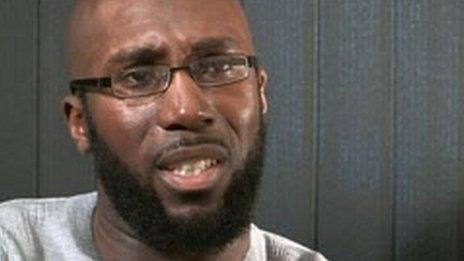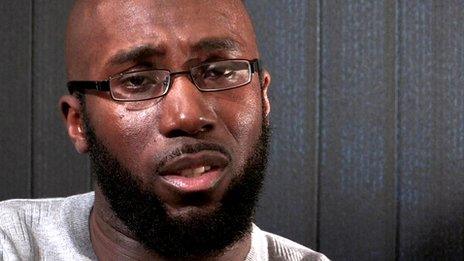Cardiff Law School slams 'inflexible' appeals system
- Published

Cardiff University students helped clear Dwaine George of murder
A project investigating miscarriages of justice has claimed people are being kept behind bars because the appeal system is "too restrictive".
Cardiff University Law School takes on real cases under the supervision of academics to look at convictions and take them to the Court of Appeal.
Cardiff's is the only Innocence Project in the UK to have helped overturn a conviction.
Its case consultant Dr Dennis Eady said the system was "inflexible".
Dwaine George, 31, was jailed in 2002 after teenager Daniel Dale was shot dead in Miles Platting, Manchester - and spent 12 years in prison.
He was a member a gang and was convicted on the basis of particles of gunshot residue.
Students' diligence
Mr George denied involvement - and analysis of his case by Cardiff law students led to a successful appeal in December 2014.
Dr Eady said: "Using advancement in science, we established that the level of residue was insignificant. It could have come from any source in the community."
Presiding judge Sir Brian Leveson said the conviction was "no longer safe" and praised the students' "diligent work".
Since that case, the project has seen a rise in prisoners contacting them, but Dr Eady said the system was not flexible enough.
Before a case can reach the appeal court, the application has to be accepted by the Criminal Cases Review Commission, an independent organisation set up to investigate suspected miscarriages, but any evidence has to be new.
"If there is a case where there is no new evidence, even if the original evidence is flawed, we are unable to make any progress," said Dr Eady.
Law student Holly Greenwood said: "We get letters from people who have heard about us on the grapevine. Even more exceptionally now, we get lawyers suggesting prisoners should write to us."

Innocence projects
The first Innocence Project was founded at the Benjamin N. Cardozo School of Law at Yeshiva University, New York, in 1992 to help prisoners claiming wrongful conviction to challenge DNA evidence
A project typically sees students from a law department investigate an alleged miscarriage of justice and can see them working with other specialist departments at a university
The first UK project was set up at the University of Bristol in 2005, with the second one founded in Cardiff.
Source: Innocence Project, external
- Published9 December 2014

- Published6 November 2014

- Published3 March 2014
